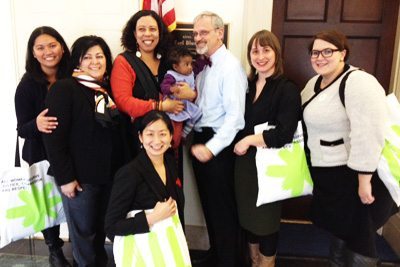Advocates Push to End Federal Abortion Funding Bans
All Above All, a campaign made up of 28 reproductive and social justice organizations, sent 125 delegates from more than 20 states to Washington, D.C., Wednesday to lobby for lifting bans on federal funding of abortions.

A broad coalition of advocates took to the U.S. Capitol on Wednesday to lobby for lifting bans on federal funding of abortions.
All Above All, a campaign made up of 28 reproductive and social justice organizations, sent 125 delegates from more than 20 states to Washington, D.C., for 90 meetings with pro-choice representatives. The campaign is a multi-year educational effort to build support for repealing the Hyde Amendment and other measures that restrict federal funding of abortions.
“We work with women every single day who are forced to carry a pregnancy to term merely because she can’t afford abortion care,” Karen Law, executive director of Pro-Choice Resources, told Rewire. She said that women routinely have to choose between their reproductive health and feeding their family or paying the electric bill.
Advocates noted that federal funding for abortion is not a cultural issue, but an economic and racial justice issue. Women of color, low-income women, Native American women, young women, and immigrant women are disproportionately affected by federal abortion funding bans. One in seven women ages 15 to 44 are insured through Medicaid, which does not cover abortion, and 49 percent of Medicaid enrollees are people of color.
“We want most of the country to look like Oregon,” said Aimee Santos-Lyons, gender justice director at the Western States Center, during a meeting with Rep. Suzanne Bonamici (D-OR). Oregon is one of 15 states that has elected to use Medicaid funds to cover abortion. The Oregon All Above All delegates also spoke to Rep. Earl Blumenauer (D-OR), who voted against the Hyde Amendment.
“Every woman should have comprehensive, affordable health care, regardless of income, Zip code, or what health insurance she has,” Santos-Lyons said.
One mother of six who lobbied with her 4-month-old infant strapped to her chest told her story of being unable to afford abortion care. She moved to Texas with $500, $300 of which she immediately had to spend on a child care deposit. She was making $10 an hour and had difficulty making appointments to arrange for her Medicaid and food stamp services. When she had an unintended pregnancy and decided she couldn’t afford another child, Planned Parenthood said there were no funds to help her afford the $450 procedure.
“I used my safety net to have this abortion,” she said.
Rep. Bonamici expressed enthusiastic support for the cause. “The people who oppose women’s reproductive rights often talk about the need for less government. Here’s a place where I agree with them,” she said. “I really do see it as a health-care decision, and certainly an economic decision.”
On the same day, legislators introduced the Women’s Health Protection Act, which would invalidate many state laws aimed at making abortion less accessible to women. Sen. Richard Blumenthal (D-CT), who sponsored the legislation, spoke at a morning rally for All Above All, which also featured Sen. Jan Schakowsky (D-IL) and Rep. Mike Honda (D-CA).
Santos-Lyons told Rewire that a key part of building this movement will be involving organizations that don’t identify as reproductive health advocates, such as immigrant or racial justice groups, and showing them the connection between reproductive health and comprehensive economic justice.
The coalition is in the process of drafting specific legislation. All Above All will be a long-term and uphill campaign, organizers said, but they want legislators to know that there is substantial grassroots support for ending these bans.
